With funding from the Foreign, Commonwealth and Development Office (FCDO), the International Organization for Migration (IOM) has launched the Climate Smart Agriculture (CSA) and nutritional garden training programme for migrant returnees. Developed and conducted by Foundations for Farming (FfF), the CSA nutritional garden trainings encompass all the principles of Conservation Agriculture (CA) and the FfF Implementation Principles to provide nutritious vegetables for families. The initiative will equip the targeted 1200 beneficiaries with a foundation for commercial vegetable production once they have met their own nutritional requirements and honed their skills as gardeners.
The COVID-19 pandemic has drastically affected Zimbabwe’s economy leaving many people unemployed, undernourished, displaced and vulnerable. Since the onset of the pandemic approximately 40 000 Zimbabweans were forced to return home with limited prospects and means to sustain themselves. From these, IOM in collaboration with the Ministry of Public Service, Labour and Social Welfare and Port Health, identified and registered beneficiaries to be part of this initiative.
The programme takes the form of practical and theoretical workshops that will enable participants to produce nutritious vegetables to feed a family from a 6m x 6m (36m²) garden. Beneficiaries are in turn provided with locally sourced kits with a range of vegetable seeds, gardening tools and fertilizer to allow them to apply their new knowledge in their home districts.
In the first week of December, the first 116 beneficiaries (68F, 48M) were trained and received the kits at Domboshawa Training Centre in Harare, and Mutare Dioceses Training Centre (MDCT) in Mutare. Speaking at a recent donor visit, CEO of Foundations for Farming Dr Matthew Mbanga said, “If adhered to, FfF’s four implementation principles: on time, at a high standard, without wastage and with joy, will ensure the participants’ success and will bring dignity to their families and communities.”
IOM Zimbabwe Chief of Mission, Mario Lito Malanca said, “The project not only promotes the livelihoods and dignity of returning migrants but also complements government efforts to eradicate poverty and hunger in Zimbabwe by 2030 as espoused in the National Development Strategy and various regional and international commitments for development and climate action.”






